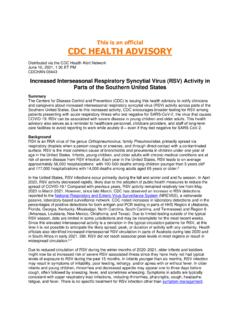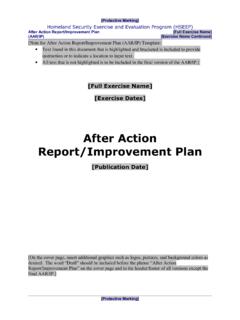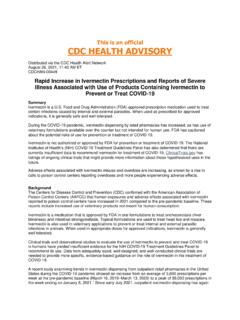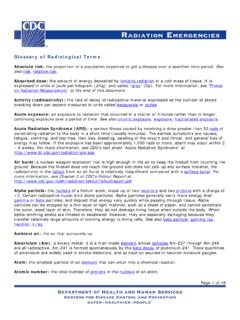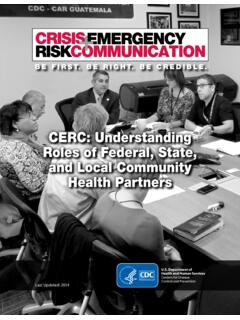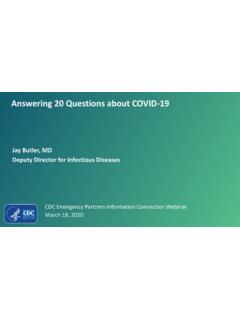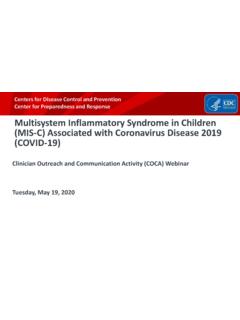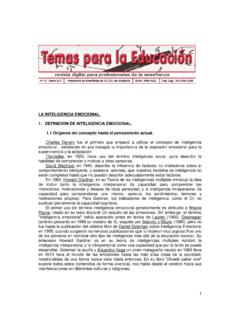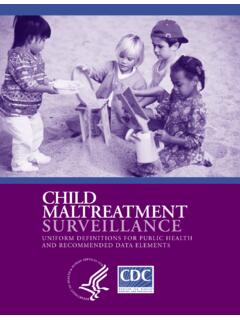Transcription of CERC: Psychology of a Crisis - CDC
1 Psychology of a CrisisPsychology of a Crisis2019 Update CS 290397-E2 CERC: Psychology of a CrisisCERC: Psychology of a CrisisExplanations of figures for accessibility found in the Appendix: Accessible Explanation of Figures on page chapter will introduce:Four Ways People Process Information During a CrisisMental States in a CrisisBehaviors in a CrisisNegative Vicarious RehearsalAddressing Psychology in the CERC RhythmCrises, emergencies, and disasters happen. Disasters are different from personal and family emergencies, and not just because they are larger in scale. Disasters that take a toll on human life are characterized by change, high levels of uncertainty, and a Crisis , affected people take in information, process information, and act on information differently than they would during non- Crisis ,3 People or groups may exaggerate their communication responses.
2 They may revert to more basic or instinctive fight-or-flight communication during a Crisis is not an attempt at mass mental therapy, nor is it a magic potion that fixes all problems. Nonetheless, to reduce the psychological impact of a Crisis , the public should feel empowered to take actions that will reduce their risk of chapter will briefly describe how people process information differently during a Crisis , the mental states and behaviors that tend to emerge in crises, how psychological effects are different in each phase of a Crisis , and how to communicate to best reach people during these changing states of : Psychology of a CrisisFour Ways People Process Information during a CrisisBy understanding how people take in information during a Crisis state, we can better plan to communicate with them.
3 During a Crisis :We simplify intense stress and possible information overload, we tend to miss the nuances of health and safety messages by doing the following: Not fully hearing information because of our inability to juggle multiple facts during a Crisis . Not remembering as much of the information as we normally could. Misinterpreting confusing action cope, many of us may not attempt a logical and reasoned approach to decision making. Instead, we may rely on habits and long-held practices. We might follow bad examples set by simple hold on to current ,6 Crisis communication sometimes requires asking people to do something that seems counterintuitive, such as evacuating even when the weather looks our beliefs during a Crisis or emergency may be difficult.
4 Beliefs are often held very strongly and not easily altered. We tend not to seek evidence that contradicts beliefs we already also tend to exploit any conflicting or unclear messages about a subject by interpreting it as consistent with existing beliefs. For example, we might tell ourselves, I believe that my house is a safe place. Before an impending hurricane, however, experts may recommend that we evacuate from an insecure location and take shelter in a building that is stronger and safer. Although the action advised is actually for us to evacuate our house to seek a safer shelter, we can easily misinterpret the recommendation to match our current beliefs. We might say, My home is strong and safe. I ve always been secure in my home.
5 When we left last time, the hurricane went north of us anyway. I ll just stay here. Faced with new risks in an emergency, we may have to rely on experts with whom we have little or no experience. Often, reputable experts disagree regarding the level of threat, risks, and appropriate advice. The tendency of experts to offer opposing views leaves many of us with increased uncertainty and fear. We may be more likely to take advice from a trusted source with which we are familiar, even if this source does not have emergency-related expertise and provides inaccurate should come from a credible : Psychology of a CrisisWe look for additional information and , 8We remember what we see and tend to believe what we ve experienced.
6 During crises, we want messages confirmed before taking action. You may find that you or other individuals are likely to do the following: Change television channels to see if the same warning is being repeated elsewhere. Try to call friends and family to see if others have heard the same messages. Turn to a known and credible local leader for advice. Check multiple social media channels to see what our contacts are cases where evacuation is recommended, we tend to watch to see if our neighbors are evacuating before we make our decision. This confirmation first before we take action is very common in a consistent believe the first a Crisis , the speed of a response can be an important factor in reducing harm.
7 In the absence of information, we may begin to speculate and fill in the blanks. This often results in rumors. The first message to reach us may be the accepted message, even though more accurate information may follow. When new, perhaps more complete information becomes available, we compare it to the first messages we of the ways we process information while under stress, when communicating with someone facing a Crisis or disaster, messages should be simple, credible, and consistent. Speed is also very important when communicating in an emergency. An effective message must do the following: Be repeated. Come from multiple credible sources. Be specific to the emergency being experienced. Offer a positive course of action that can be accurate messages as soon as : Psychology of a CrisisMental States in a Crisis During a disaster, people may experience a wide range of emotions.
8 Psychological barriers can interfere with cooperation and response from the public. Crisis communicators should expect certain patterns, as described below, and understand that these patterns affect are a number of psychological barriers that could interfere with cooperation and response from the public. A communicator can mitigate many of the following reactions by acknowledging these feelings in words, expressing empathy, and being , there are more questions than answers during a Crisis , especially in the beginning. At that time, the full magnitude of the Crisis , the cause of the disaster, and the actions that people can take to protect themselves may be unclear. This uncertainty will challenge even the greatest reduce their anxiety, people seek out information to determine their options and confirm or disconfirm their beliefs.
9 They may choose a familiar source of information over a less familiar source, regardless of the accuracy of the provided They may discount information that is distressing or overwhelming. Many communicators and leaders have been taught to sound confident even when they are uncertain. While this may inspire trust, there is a potential for overconfidence, which can backfire. It is important to remember that an over-reassured public isn t the goal. You want people to be concerned, remain vigilant, and take all the right uncertainty. Acknowledge and express empathy for your audience s uncertainty and share with them the process you are using to get more information about the evolving situation. This will help people to manage their anxiety.
10 Use statements such as, I can t tell you today what s causing people in our town to die so suddenly, but I can tell you what we re doing to find out. Here s the first Tell them What you know. What you don t know. What process you are using to get we can hope for certain outcomes, we often cannot promise that they will occur. Instead of offering a promise outside of your absolute control, such as we re going to catch the evil people who did this, promise something you can be sure that response officials will do, such as we re going to throw everything we have at catching the bad guys, or stopping the spread of disease, or preventing further flood damage. Former New York City Mayor Rudolph Giuliani cautioned, Promise only when you re positive.

